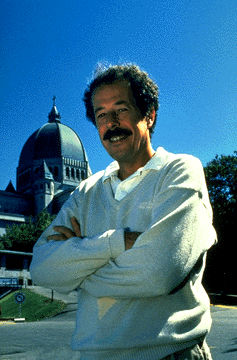For decades, Quebec directors have been shaping the Canadian film industry. Their works have captivated audiences and critics around the world. Drawing on Quebec's culture and history, these filmmakers contribute to reflections on the country's francophone experience. The following people are some of the most important figures in Quebec cinema.
Pierre Perrault (1927–1999)
Pierre Perrault started his radio career as a scriptwriter and presenter. In 1963, he joined the National Film Board of Canada (NFB) and released his documentary Pour la suite du monde, the first Quebec film selected at the Cannes Film Festival. This feature film shot on Île aux Coudres was a testament to the islanders' traditions and culture. At the time, Perrault embraced an innovative approach known as “direct cinema”. He collaborated with filmmaker Michel Brault to achieve the immersive, poetic and realistic effect of this film. In the eyes of fans, the two artists remain the leading figures of Canadian direct cinema.

Perrault explored the themes of his films with poetic delicacy, vernacular storytelling and a humanist perspective. His documentaries and films were characterized by a search for truth and a desire to give a voice to ordinary people.
Some of his works highlight the daily lives of those who cleared the land and colonized Quebec. His film series, Le cycle abitibien, transported viewers into this universe. It included the documentaries “Un royaume vous attend” (1975), “Le retour à la terre” (1976), “C'était un Québécois en Bretagne madame !” (1977) and “Gens d'Abitibi” (1980).
Gilles Carle (1928–2009)
In 1960, Gilles Carle began working at the NFB as a researcher and scriptwriter. He directed several documentaries, including Percé on the rocks (1964). In 1965, he directed his first feature film, La Vie heureuse de Léopold Z.

In 1966, he joined Onyx Films, where he directed notable films such as Le Viol d'une jeune fille douce (1968), Red (1970) and Les Mâles (1971). In 1971, he co-founded the production company Productions Carle-Lamy. Classics of Quebec cinema were created there, including La vraie nature de Bernadette (1972) and La Mort d'un bûcheron (1973).
In the 1980s, he adapted two of Quebec's leading literary works to the screen: Les Plouffe (1981), followed by Maria Chapdelaine in 1983. When he died in 2009, Quebec celebrated his exceptional contribution with a state funeral.
Denys Arcand (1941–)
Denys Arcand addresses social and political issues in his works, offering incisive critiques of Quebec society. His documentary On est au coton (1970) denounced working conditions in the textile industry, sparking a national debate on workers' rights. His feature-length fiction films, The Decline of the American Empire (1986) and Barbarian Invasions (2003), addressed the subjects of social decay, human interaction and the cultural transformations of the late 20th and early 21st centuries. Arcand uses satire and humour to tackle complex issues. His film scripts also include historical and philosophical references. In 2004, Barbarian Invasions won the Oscar for Best Foreign Film, a first for a Quebec film.

Jean-Marc Vallée (1963–2021)
Jean-Marc Vallée began his professional adventure by producing music videos. He demonstrated his directing talents with the short film Stereotypes (1992). In 1995, he directed his first feature film, Liste noire, a suspense thriller that was a commercial success and received nine Genie Award nominations.
Vallée gained international recognition with the feature film C.R.A.Z.Y. (2005), a dramatic film that explored the identity issues faced by a gay teenager raised in a traditional family. This film project won numerous awards, including the Genie and Jutra awards (see Prix Iris).

Over the years, he became increasingly in demand in Hollywood. In particular, he directed: The Young Victoria (2009), Dallas Buyers Club (2013) and Wild (2014). Dallas Buyers Club won three Oscars, including Best Actor for Matthew McConaughey and Best Supporting Actor for Jared Leto. Vallée is also known for his work in television, notably the HBO series Big Little Lies (2017–19) and Sharp Objects (2018), for which he won several Emmy Awards.
Vallée was one of the most prolific of today's new generation of Quebec filmmakers.
Denis Villeneuve (1967–)
After studying cinema at the Université du Québec à Montréal, Denis Villeneuve began his career directing short documentaries for La course destination monde (Europe-Asia) by Radio-Canada from 1990 to 1991 ― a competition he later won.

This success brought him to the NFB, where he directed REW-FFWD (1994). He quickly made a name for himself with landmark films such as Un 32 août sur terre (1998), Maelström (2000), Polytechnique (2009) and Incendies (2010), which was nominated for an Oscar in the Best Foreign Language Film category. These works have captivated Quebec audiences and won international acclaim.
He is now one of the most influential filmmakers in Hollywood, where he has directed films such as Arrival (2016), Blade Runner 2049 (2017), Dune: Part One (2021) and Dune: Part Two (2024).
Philippe Falardeau (1968–)
From 1992 to 1993, Philippe Falardeau participated in the television show La course destination monde and won the competition. Then he took a humorous, satirical look at Chinese immigration to Canada with Pâté chinois (1997).
His first feature film, La Moitié gauche du frigo (2000), was well received. He then went on to make hit films such as Congorama (2006), C'est pas moi, je le jure! (2008) and Monsieur Lazhar (2011). The latter was nominated for an Oscar in 2012 in the Best Foreign Language Film category. His adaptation of Alain Farah's novel Mille secrets mille dangers is due to hit theatres in 2025.
Anaïs Barbeau-Lavalette (1979–)
Anaïs Barbeau-Lavalette began her career as a filmmaker with social and political documentaries such as Les Petits princes des bidonvilles (2000), which won the Audience Award at Montreal's Muestra Cultural Festival. She co-directed Buenos Aires, no llores (2001), a documentary that won awards at several international film festivals. In 2002, she took part in the Odyssée du volontariat, where she directed a series of short films about volunteering. These documentaries were broadcast in seven languages in over a hundred countries.
Among these documentaries were Les mains du monde (2004), which featured people who have made social activism their only response to problems such as loneliness and poverty, and Si j'avais un chapeau (2005), which gave children from various countries a voice.
From 2004 to 2010, she participated in the Wapikoni Mobile project, a non-profit Indigenous organizations that encourages and helps Indigenous youth express their audiovisual creativity.
In 2007, she directed her first feature film, Le Ring. Her documentary Les Petits Géants (2009), co-produced with Émile Proulx-Cloutier, won the Gémeaux Award for best documentary. She also directed Se souvenir des cendres (2010), a documentary about filming Denis Villeneuve’s Incendies.
Xavier Dolan (1989–)
Xavier Dolan made his first appearances on television when he was four years old. He regularly appeared on television commercials and in Quebec drama series such as Omertà, la loi du silence (1996) and L’Or (2001). He also makes a living dubbing movies and series, from English to Quebec French. When he was 17, he directed his first feature film J'ai tué ma mère (2009), which attracted attention at the Cannes Film Festival's Directors' Fortnight and went on to win several awards.
Since then, he has directed several films that have been celebrated by cinema critics including: Les Amours imaginaires (2010), Laurence Anyways (2012), Tom à la ferme (2013), Mommy (2014) and Juste la fin du monde (2016), which won the Grand Prix at the Cannes Film Festival.
In addition to his film work, Dolan directs music videos for famous artists such as Adele. He won a Juno Award for Music Video of the Year for Easy on Me.


 Share on Facebook
Share on Facebook Share on X
Share on X Share by Email
Share by Email Share on Google Classroom
Share on Google Classroom


